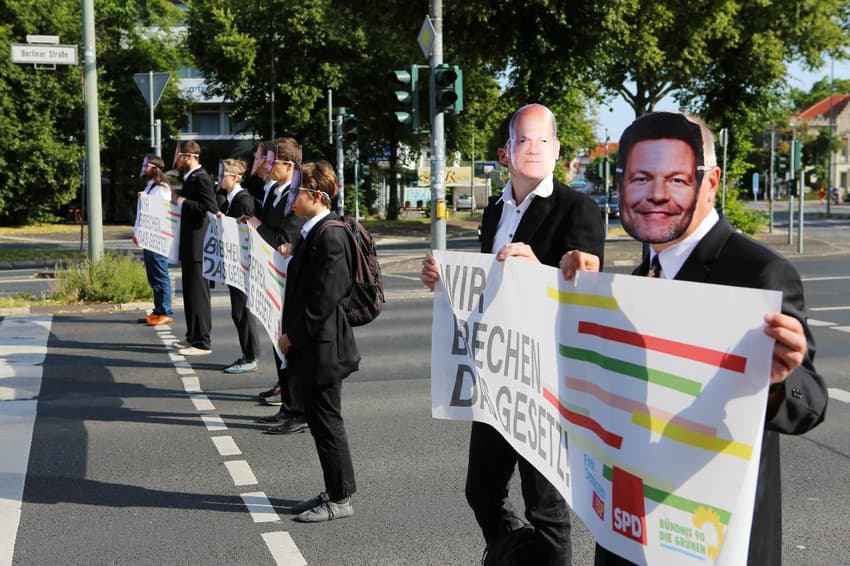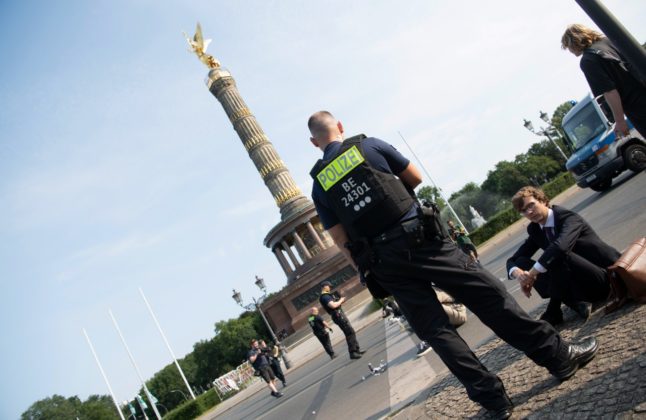What to know about Friday's nationwide climate protests in Germany

Climate activists from Last Generation blocked 36 roads as part of a national day of protest on Friday, with traffic in several German cities affected.
What's happening?
Just a day after two of Germany's busiest airports - Hamburg and Düsseldorf - had to ground flights for several hours due to climate protests, activists from Last Generation have launched a national day of action that will bring traffic in multiple cities grinding to a halt.
This time, rather than airport runways, the activists have stuck themselves to roads in at least 26 cities across the country. Some are dressed as Chancellor Olaf Scholz (SPD), Economics Minister Robert Habeck (Greens) and Transport Minister Volker Wissing (FDP) and are holding banners that declare: "We are breaking the law."
According to reports in German media, the protests are focussed on busy thoroughfares such as Berlin's Straße der 17. Juni - which cuts through Tiergarten from Mitte to Charlottenburg.
Drivers should therefore expect some disruption when travelling along motorways and through busy city centres on Friday, though some of the roads could be cleared by the early or late afternoon.
READ ALSO: Flights resumed at Düsseldorf and Hamburg airports after climate protest
How could my journey be affected?
There are likely to be some delays and traffic jams along busy roads and in stretches of the Autobahn near major cities.
In Berlin, much of the action is focussed on the roads around the Siegessäule (Victory Column), with activists gluing themselves to the roundabout to block access to both Straße der 17. Juni in the direction of Brandenburger Tor and Hofjägerallee.

Activists from Last Generation block roads around the Victory Column in Berlin. Photo: picture alliance/dpa | Paul Zinken
Last Generation said they had also set up blockades near the main train station. According to police, activists also temporarily blocked traffic at the Dorotheenstraße/Ebertstraße intersection in Mitte, not far from the Reichstag building. However, authorities said late on Friday morning that they had been able to clear these streets for traffic.
There has also been disruption on streets in other German cities. In Dresden, for example, activists dressed as politicians blocked the motorway exit at Elbepark, and activists are also reported to have blocked a busy street in Leipzig.
Protest actions are also said to be underway in Munich, Braunschweig, Göttingen, Freiburg, Ulm, Potsdam and - in spite of a recently issued ban - in Nuremberg as well.
What's the reason for the latest protests?
With the latest round of blockades, activists say they want to raise awareness of government inaction on climate change - particular in the transport sector. Under the government's Climate Protection Law, Transport Minister Volker Wissing (FDP) has until July 17th to put forward an emergency plan for meeting emissions targets - but has so far failed to do so.
"The federal government is breaking the law and leading our society into collapse," said Last Generation activist Carla Rochel. "It is our democratic duty to peacefully resist this."
++ Transparenzkampagne der Bundesregierung in 26 Städten ++
Die Regierungsvertreter Olaf Scholz, Volker Wissing & Robert Habeck bekennen sich öffentlich zu ihrem Bruch des Klimaschutzgesetzes und unterbrechen heute in 26 Städten den Kurs in den Klimakollaps.
1/5 pic.twitter.com/I8Gg8u5XCf
— Letzte Generation (@AufstandLastGen) July 14, 2023
The group also defended its controversial tactics, arguing that the disruption was necessary in order to pressure the government to stick to its own targets.
"With our peaceful sit-in today, we are asking the question: what should we be outraged about?", said Last Generation spokesperson Silvia Klesz. "About a government that breaks its own laws or about peaceful protest by citizens who do not simply accept this breaking of the law?"
How have the authorities responded?
The latest round of climate protests has led to renewed calls for tougher action on activists who engage in civil disobedience or break the law, as well as tighter security measures at airports.
Following two Last Generation protests that grounded flights at Hamburg and Düsseldorf airports on Thursday morning, Interior Minister Nancy Faeser (SPD) announced that she would be presenting new security standards for critical infrastructure in the near future.
READ ALSO:
- German police carry out nationwide raids against climate activists
- German prosecutors admit to tapping climate activists' phones
"There will soon be genuine standards for the operators of critical infrastructure," said the SPD politician. "This also includes airports, and this will lead to an additional level of security."
Ahead of Friday's protests, several local authorities tried to prevent the action with bans on street blockades that hadn't been registered with the authorities beforehand.
In Nuremberg, for example, activists have been threatened with €3,000 fines for taking part in Friday's climate protests, while organisers could spend up to a year in prison.
Comments (1)
See Also
What's happening?
Just a day after two of Germany's busiest airports - Hamburg and Düsseldorf - had to ground flights for several hours due to climate protests, activists from Last Generation have launched a national day of action that will bring traffic in multiple cities grinding to a halt.
This time, rather than airport runways, the activists have stuck themselves to roads in at least 26 cities across the country. Some are dressed as Chancellor Olaf Scholz (SPD), Economics Minister Robert Habeck (Greens) and Transport Minister Volker Wissing (FDP) and are holding banners that declare: "We are breaking the law."
According to reports in German media, the protests are focussed on busy thoroughfares such as Berlin's Straße der 17. Juni - which cuts through Tiergarten from Mitte to Charlottenburg.
Drivers should therefore expect some disruption when travelling along motorways and through busy city centres on Friday, though some of the roads could be cleared by the early or late afternoon.
READ ALSO: Flights resumed at Düsseldorf and Hamburg airports after climate protest
How could my journey be affected?
There are likely to be some delays and traffic jams along busy roads and in stretches of the Autobahn near major cities.
In Berlin, much of the action is focussed on the roads around the Siegessäule (Victory Column), with activists gluing themselves to the roundabout to block access to both Straße der 17. Juni in the direction of Brandenburger Tor and Hofjägerallee.

Last Generation said they had also set up blockades near the main train station. According to police, activists also temporarily blocked traffic at the Dorotheenstraße/Ebertstraße intersection in Mitte, not far from the Reichstag building. However, authorities said late on Friday morning that they had been able to clear these streets for traffic.
There has also been disruption on streets in other German cities. In Dresden, for example, activists dressed as politicians blocked the motorway exit at Elbepark, and activists are also reported to have blocked a busy street in Leipzig.
Protest actions are also said to be underway in Munich, Braunschweig, Göttingen, Freiburg, Ulm, Potsdam and - in spite of a recently issued ban - in Nuremberg as well.
What's the reason for the latest protests?
With the latest round of blockades, activists say they want to raise awareness of government inaction on climate change - particular in the transport sector. Under the government's Climate Protection Law, Transport Minister Volker Wissing (FDP) has until July 17th to put forward an emergency plan for meeting emissions targets - but has so far failed to do so.
"The federal government is breaking the law and leading our society into collapse," said Last Generation activist Carla Rochel. "It is our democratic duty to peacefully resist this."
++ Transparenzkampagne der Bundesregierung in 26 Städten ++
— Letzte Generation (@AufstandLastGen) July 14, 2023
Die Regierungsvertreter Olaf Scholz, Volker Wissing & Robert Habeck bekennen sich öffentlich zu ihrem Bruch des Klimaschutzgesetzes und unterbrechen heute in 26 Städten den Kurs in den Klimakollaps.
1/5 pic.twitter.com/I8Gg8u5XCf
The group also defended its controversial tactics, arguing that the disruption was necessary in order to pressure the government to stick to its own targets.
"With our peaceful sit-in today, we are asking the question: what should we be outraged about?", said Last Generation spokesperson Silvia Klesz. "About a government that breaks its own laws or about peaceful protest by citizens who do not simply accept this breaking of the law?"
How have the authorities responded?
The latest round of climate protests has led to renewed calls for tougher action on activists who engage in civil disobedience or break the law, as well as tighter security measures at airports.
Following two Last Generation protests that grounded flights at Hamburg and Düsseldorf airports on Thursday morning, Interior Minister Nancy Faeser (SPD) announced that she would be presenting new security standards for critical infrastructure in the near future.
READ ALSO:
- German police carry out nationwide raids against climate activists
- German prosecutors admit to tapping climate activists' phones
"There will soon be genuine standards for the operators of critical infrastructure," said the SPD politician. "This also includes airports, and this will lead to an additional level of security."
Ahead of Friday's protests, several local authorities tried to prevent the action with bans on street blockades that hadn't been registered with the authorities beforehand.
In Nuremberg, for example, activists have been threatened with €3,000 fines for taking part in Friday's climate protests, while organisers could spend up to a year in prison.
Join the conversation in our comments section below. Share your own views and experience and if you have a question or suggestion for our journalists then email us at [email protected].
Please keep comments civil, constructive and on topic – and make sure to read our terms of use before getting involved.
Please log in here to leave a comment.